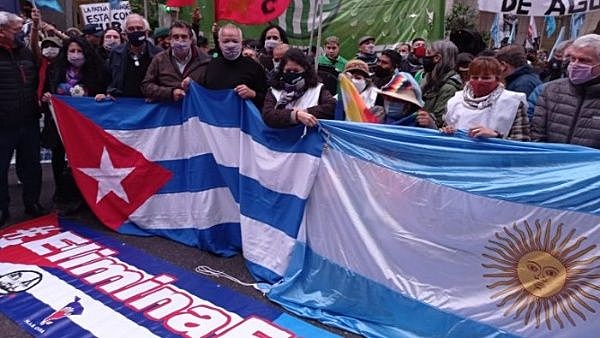The seventh summit of the Community of Latin American and Caribbean States (CELAC), hosted by Argentina – the country that temporarily holds the presidency of the bloc – will be preceded for the first time by a joint proposal of social and trade union organizations. The Social Summit will take place this Monday afternoon (23rd) in the city of Buenos Aires, at the former Naval Mechanics School, a former secret detention center during the military dictatorship, which today functions as a space resigned from the perspective of human rights.
With the presence of about 300 leaders of social organizations, unions and popular movements from all over the region, the meeting is a forum to discuss the most relevant issues affecting the different countries in the context of the Conference of Heads of State and Government. The Central Unified Workers (CUT, in Portuguese) and the Brazilian Landless Rural Workers Movement (MST, in Portuguese) are among the organizations that make up the Brazilian delegation to the event.
In its call, the Latin American and Caribbean Confederation of State Workers (Clate, in Spanish), one of the organizations participating in the Social Summit, highlights the search for "the institutionalization of permanent spaces for dialogue between governments and social organizations and movements, and the participation of organized civil society".
Agendas under debate
In a context of weakening democratic processes in different countries of the region, one of the main proposals discussed is related to regional integration, in search of a common agenda. Among the issues highlighted are inequality and hunger in the territories, the need for economic independence, the fight against the extreme right, the US blockade of the countries of the region and the presence of military bases in strategic areas.
One of the organizers of the summit, Manuel Bertoldi, member of the Secretariat of the Alba Movements and the International Peoples' Assembly, defines the space as a mechanism for regional strengthening. "This integration is very important for us, and it leaves out the imperialist interests that have historically blocked the intentions of sovereignty and self-determination of our peoples," he points out to Brasil de Fato.
Three main points are highlighted as necessary deepenings that permeate the multiple topics to be discussed this Monday: to better understand this stage of structural crisis of the capitalist system; to add elements to analyze the regional conjuncture of destabilization of democracy in the territories; and to discuss the challenges of regional integration from social bases.
"We need to advance in the mobilization processes to defend the conquests we have had, but also to advance in other conquests, especially in the construction of sovereign popular projects, self-determined by each of our peoples," he says.
Quintino Severo, CUT Deputy Secretary for International Relations, celebrates the return of face to face dialogue between popular movements and social and political organizations in the region. "It is an important moment to mark this resumption," he points out, highlighting some of the main issues to be discussed from the CUT's perspective.
"The continent must reinforce the theme of democracy, acting and defending the self-determination of peoples. We also have to deal with the fight against hunger and social inequalities. Our region is very unequal and we need more practical action in this struggle. Obviously, this includes the creation of jobs and income, social and labor rights; it is something much broader," he argues.
"Regional integration is the most difficult issue, but there is no doubt that doing it at the social, economic and political levels is the key," he adds.
With regard to the regional economy, the need to develop political autonomy is being questioned, especially in the context of the logic of indebtedness that prevails throughout the region and is operated by institutions such as the International Monetary Fund (IMF). One of the proposals discussed is the possibility of promoting tax agreements between countries in order to detect capital flight from local speculators.
In addition, the Social Summit seeks to address the issue from a transversal perspective. "As public sector workers, it is fundamental to maintain the democratic system," emphasizes Julio Fuentes, director of Clate.
"For us, one of the issues that must be actively addressed is the relationship between governments and the public sector, through compliance with international agreements, especially ILO 151, which is a collective bargaining agreement. We should also establish a minimum floor for any kind of foreign investment in the region, which would allow the promotion of a reciprocal provisional system. All of this from an integrationist perspective," he stresses.
Mobilization
The Celac Social will continue its activities with a mobilization on Tuesday (24th), the day of the Celac Presidential Summit, with a march in the city center to the Sheraton Hotel, where the heads of state and government will meet. The slogan of the march will be "Latin American and Caribbean Integration: Stopping the New Plan Condor in the region".




